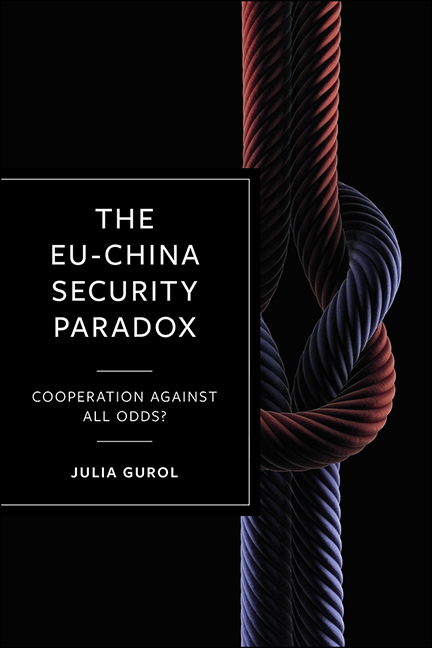Book contents
- Frontmatter
- Contents
- List of Figures
- List of Tables
- List of Abbreviations
- About the Author
- Acknowledgements
- 1 The EU and China in a Changing International Environment
- 2 Analytical Framework: Towards Multidimensionality
- 3 The EU’s and China’s Foreign and Security Policy Principles
- 4 The EU and China on the Global Stage: Interests and Interdependence
- 5 Framing and Perceptions in EU–China Security Relations
- 6 EU–China Relations on Anti-Terrorism
- 7 EU–China Relations on Maritime Security and Anti-Piracy
- 8 EU–China Relations on Climate and Energy Security
- 9 The US: An Elephant in the Room for EU–China Security Relations
- 10 Conclusion and Outlook: The EU and China at a Crossroads
- Notes
- References
- Index
6 - EU–China Relations on Anti-Terrorism
Published online by Cambridge University Press: 15 September 2022
- Frontmatter
- Contents
- List of Figures
- List of Tables
- List of Abbreviations
- About the Author
- Acknowledgements
- 1 The EU and China in a Changing International Environment
- 2 Analytical Framework: Towards Multidimensionality
- 3 The EU’s and China’s Foreign and Security Policy Principles
- 4 The EU and China on the Global Stage: Interests and Interdependence
- 5 Framing and Perceptions in EU–China Security Relations
- 6 EU–China Relations on Anti-Terrorism
- 7 EU–China Relations on Maritime Security and Anti-Piracy
- 8 EU–China Relations on Climate and Energy Security
- 9 The US: An Elephant in the Room for EU–China Security Relations
- 10 Conclusion and Outlook: The EU and China at a Crossroads
- Notes
- References
- Index
Summary
Introduction
With the globalization of security and the increase of transnational, nontraditional security concerns, terrorist and non-state armed groups have replaced conventional military threats as the main security hazards to many states (Kaldor, 2012). Especially since the end of the Cold War, the diversification of terrorist groups has become recognized as a substantial transnational security menace (Albanese, 2012) that poses severe challenges to economic and social stability (Bossong and Holmes, 2016).
Consultations between the EU and China with regard to counterterrorism measures take place on both the bilateral and multilateral levels. On the bilateral level, the EU–China Dialogue on Security and Defence, the Informal Dialogue on the Middle East and North Africa and, to some extent, the EU–China Dialogue on Human Rights (concerning terrorist activities in mainland China) address these issues. Additionally, the EU and China have organized several meetings under the ASEM Framework, in which they have addressed transnational terrorism. In 2003, the first ASEM counter-terrorism meeting was held in Beijing and then took place annually until 2012. In the context of the 10th general ASEM summit in 2014, the EU and China decided to launch an institutionalized forum to discuss the political situation in the Middle East (extending to Afghanistan and Central Asia), Northern Africa and the Sahel zone. This forum was expected to foster joint Chinese-European activities to combat the rise of extremism and terrorism in these regions – a plan that was never put into practice. Yet efforts to establish joint counter-terrorism measures continued. In 2016, the EU's law enforcement agency EUROPOL and the Chinese Ministry of Public Security (MPS) joined the Agreement on Strategic Cooperation (EUROPOL, 2016) that includes the exchange of information and intelligence.
On the multilateral level, the UN provides the main framework for antiterrorism, in particular the UN Office of Counter-Terrorism (UNOCT) and the UN Global Counter-Terrorism Coordination Compact. Both China and the EU stress the UN's crucial role in counter-terrorism and adhere to its principles. Beyond this, both are part of international UN-led counter-terrorism talks. The first state commissioner for counter-terrorism and security matters represents China in these meetings.
- Type
- Chapter
- Information
- The EU-China Security ParadoxCooperation against All Odds?, pp. 83 - 98Publisher: Bristol University PressPrint publication year: 2022



